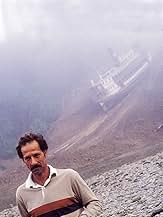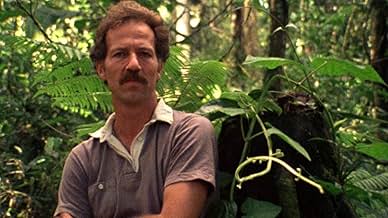Ajouter une intrigue dans votre langueA documentary following German auteur Werner Herzog as he deals with difficult actors, bad weather and getting a boat over a mountain, all in an effort to make his film Fitzcarraldo (1982).A documentary following German auteur Werner Herzog as he deals with difficult actors, bad weather and getting a boat over a mountain, all in an effort to make his film Fitzcarraldo (1982).A documentary following German auteur Werner Herzog as he deals with difficult actors, bad weather and getting a boat over a mountain, all in an effort to make his film Fitzcarraldo (1982).
- A remporté le prix 1 BAFTA Award
- 4 victoires et 1 nomination au total
- Self
- (as Alfredo de Rio Tambo)
- Self
- (as Angela Reine)
- Self
- (as Elia de Rio Ene)
- Self
- (as David Perez Espinosa)
- Self
- (as Miguel Angel Fuentes)
- Self
- (as Father Mariano Gagnon)
- Self
- (as Huerequeque Bohoroquez)
Avis en vedette
Unfortunately, it did not reveal much about Fitzcarraldo. I had read about the problems Herzog had during the filming, and this is basically what Burden's focus is. The documentary does not go deep enough, though. I would say about a quarter of it (its running length is just over 90 minutes) is made up of actual scenes from Fitzcarraldo with maybe a short paragraph to describe the setting and maybe some small bit of behind-the-scene narrative.
Another section of the film is made up of interviews with the cast and crew. This should have been the lifeblood of this documentary, but it was not. Herzog's own interviews were interesting, but it is more or less him complaining because things are not going his way (which he has a right to complain about, but it isn't all that interesting to watch). He has this very silly monologue where he complains about how the jungle symbolizes the death of the world, when really the only thing symbolizing death is his dying film. Very disappointing is the documentarians' inability to get interviews with the cast. I was seriously hoping for some of Klaus Kinski's patented insanity and also at least one interview with the great Claudia Cardinale. There was one tiny interview with Kinski where he complained about having cabin fever for being stuck in the cast camps for weeks at a time, completely justifiable, I would say, and there are no interviews with Cardinale (although she may have been interviewed before I started watching). It made me feel a little disappointed that no documentarians had been there to film Aguirre, the Wrath of God, where Kinski absolutely flipped out!
Never fear, though. There is one very good part of this film: it serves as an ethnographic document for the Indians of South America. Herzog rightly claims that their parts in Fitzcarraldo itself were not sufficiently ethnographic, since they were just doing what he was asking of them. But in the documentary, we see the Indians making masato, an alcoholic drink made of yucca and saliva, we see them playing games such as arrow catching, we even see an attack from a different tribe that believes that the Indians who are working on the film have come to attack them. All of this is extremely interesting. 7/10
In 1983 I thought it was brilliant and it was immensely valuable to get an insight into the tortured making of the film "Fitzcarraldo". Seeing it again, almost two decades later, I feel the film skims the surface as Les Blank seems to have little interest in drawing out what went on. He just observes and accepts the events at face value. Only Herzog is interviewed at any length and the burden of his dream(s) does become apparent as the film progresses, however there is virtually no comment from Kinski or the other actors. Les Blank might argue that the film is about Herzog's state of mind and his attitude to the production of Fitzcarraldo. In this, I think it is largely a success. To look for more from the film is perhaps to unfairly employ the benefit of hindsight.
I suspect my disappointment (relative) at seeing this again is the release of "My Best Fiend" in the interim. I find my memory conflating the two films, the piece about Kinski's "hate hate" relationship with the jungle (and almost everything else!) would seem more appropriate to "Burdens" but is in "Fiend".
"Burden of Dreams" and "My Best Fiend" would make a good double bill, giving a much more rounded impression of the context of the production of Fitzcarraldo and the relationship between Herzog and Kinski. If you are interested, try to see them both.
While not everything that could go wrong on a film goes wrong on Fitzcarraldo- the making of it I mean, not the film, of which I've yet to actually see myself- but it comes close. Along with Hearts of Darkness and Lost in La Mancha, Blank's film ranks as a contender for showing the most chaotic film production imaginable, but perhaps outdoes the others with Blank's purer skills as a documentarian. One might almost hope at times that Blank might editorialize, but there's none of that here. The narration as well just gives the facts as if reading out of a film magazine. And what's extraordinary though is that you don't need to see Fitzcarraldo to understand what the film's about through this one. The story is, as Herzog describes, about opera in the jungle, and how an obsessed opera fan (played by Klaus Kinski) decides to lug his ship over a mountain so he can build an opera in the jungle. Soon, however, Blank shows that this very act becomes an even more daunting task/metaphor than Herzog might have intended, but never do we see him decide to just give up. "I live my life or I end my life with this picture," Herzog says.
It would be one thing if Blank just looked at the film-making process from start to finish with Fitzcarraldo, and I imagine Blank probably had enough footage to make for an even longer film just covering the odds & ends of filming. But we as the viewer soon come to realize that to make Fitzcarraldo requires an understanding of the people behind it, not just the main man behind it, but of the tribe. It's interesting to note that the natives Herzog uses the first time around show one side of the 'nature' of what comes in filming in foreign territory: they attack the film crew, forcing Herzog to find a new location. This first major set-back is only covered briefly early on in the film, but it fascinated me how Herzog still remained undeterred, even though it ended up taking him another year to settle on the final locations. Then Blank turns his camera on the natives lending their support (for more money than they usually get with the usual labor they work for), and it's done sometimes with the same care of getting great glimpses of the culture, of what habits and customs are with them (like the alcohol/fruit that's a given for them), and how the tensions start to rise as the film backs up. Blank's camera is terrifically poised in these moments, and he ends up also getting a fine comparison between the film crew itself. Only Kinski, who I would think would be the only person more of interest, is usually left out, which is disappointing.
But the real excitement is seeing the daily struggles of filming, and how the boat-over-the-mountain metaphor becomes apart of this struggle, be it something small like getting a rubber-skewer right (which is very funny), or in getting that toughest of shots at the "magic hour" of the dusk. And the problems keep mounting, until what we see is a filmmaker almost too reckless for his own good, yet perhaps for his own sanity as well. I can't imagine what might have happened to Werner Herzog had he not taken that final shot, or if he had, like Coppola to an extent with Apocalypse Now, sort of succumbed to the jungle's dangers like a Conrad character. What we end up seeing of Herzog is perhaps a man under the duress and total stress of film-making- or total control, who can say- but even when he's at his bleakest statements, it's never boring or pretentious to hear what Herzog has to say about the jungle or the people or to see how he directs. And around Herzog, and that giant boat, and the natives and the jungle, Blank creates the kind of behind-the-scenes documentary unique, where psychology and anthropology get brilliant put into the context of 'filming dreams', as it were.
Le saviez-vous
- AnecdotesThroughout production, Les Blank and his small crew became exhausted and exasperated from the stress of the work. Blank said that he felt "unconnected" to the people around him. Keeping up with the antics of Werner Herzog and Klaus Kinski proved difficult for the reserved, introverted Blank. By the last week of production, he was so burnt out that he feared coming out of production "like some Viet Nam veterans, horribly calloused". He wrote in his journal, "I'm tired of it all and I couldn't care less if they move the stupid ship - or finish the fucking film".
- Citations
Werner Herzog: [On the jungle] Kinski always says it's full of erotic elements. I don't see it so much erotic. I see it more full of obscenity. It's just - Nature here is vile and base. I wouldn't see anything erotical here. I would see fornication and asphyxiation and choking and fighting for survival and... growing and... just rotting away. Of course, there's a lot of misery. But it is the same misery that is all around us. The trees here are in misery, and the birds are in misery. I don't think they - they sing. They just screech in pain. It's an unfinished country. It's still prehistorical. The only thing that is lacking is - is the dinosaurs here. It's like a curse weighing on an entire landscape. And whoever... goes too deep into this has his share of this curse. So we are cursed with what we are doing here. It's a land that God, if he exists has - has created in anger. It's the only land where - where creation is unfinished yet. Taking a close look at - at what's around us there - there is some sort of a harmony. It is the harmony of... overwhelming and collective murder. And we in comparison to the articulate vileness and baseness and obscenity of all this jungle - Uh, we in comparison to that enormous articulation - we only sound and look like badly pronounced and half-finished sentences out of a stupid suburban... novel... a cheap novel. We have to become humble in front of this overwhelming misery and overwhelming fornication... overwhelming growth and overwhelming lack of order. Even the - the stars up here in the - in the sky look like a mess. There is no harmony in the universe. We have to get acquainted to this idea that there is no real harmony as we have conceived it. But when I say this, I say this all full of admiration for the jungle. It is not that I hate it, I love it. I love it very much. But I love it against my better judgment.
Meilleurs choix
- How long is Burden of Dreams?Propulsé par Alexa
Détails
- Date de sortie
- Pays d’origine
- Langues
- Aussi connu sous le nom de
- Pelicula o muerte
- Lieux de tournage
- sociétés de production
- Consultez plus de crédits d'entreprise sur IMDbPro
Contribuer à cette page






























